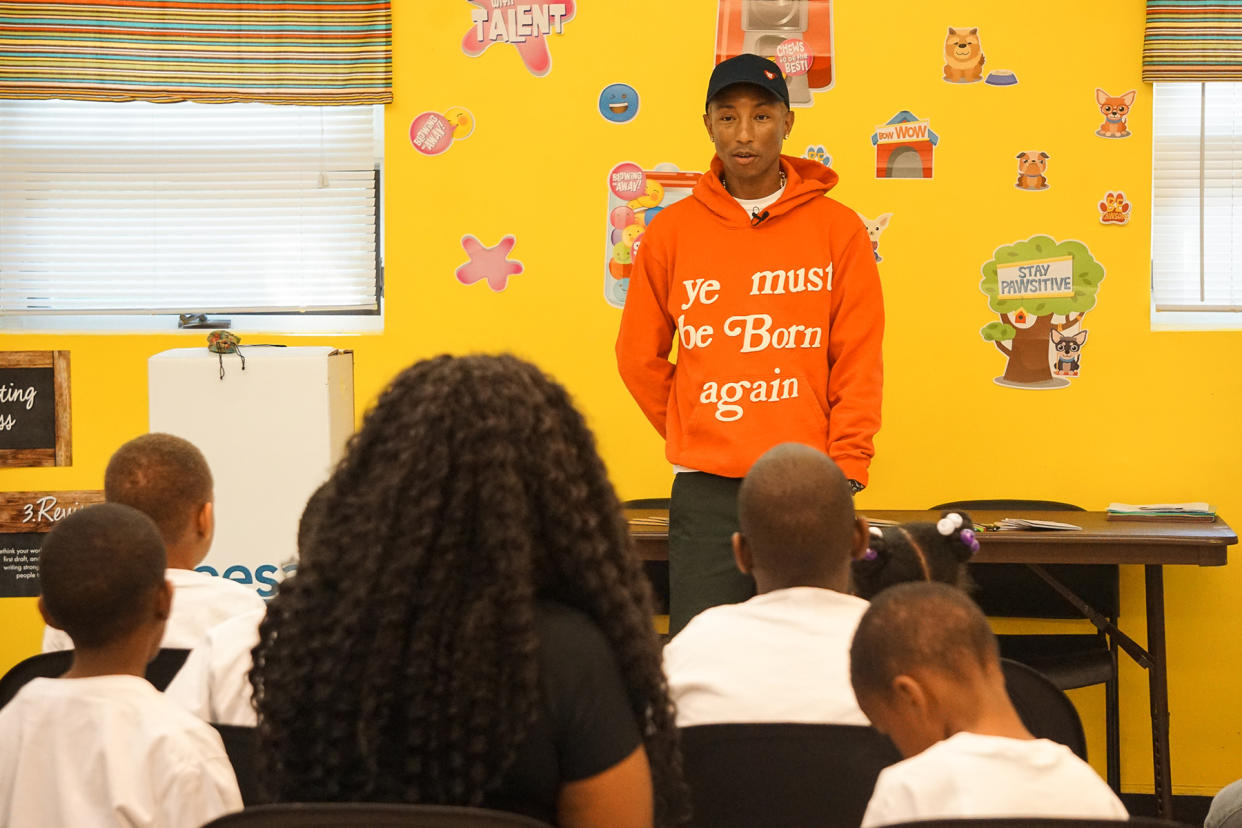‘The Paradigm Needs to Shift’: Why Pharrell Wants to Prep Marginalized Students for Tech Jobs

- Oops!Something went wrong.Please try again later.
Like most weeks for Pharrell Williams, this one is packed. On Thursday, he and Neptunes co-producer Chad Hugo will be inducted into the Songwriters Hall of Fame. This weekend, he’ll host the latest edition of his Something in the Water Festival. And then there’s his most philanthropic latest venture, announced today: helping underprivileged kids avoid low-paying jobs.
As Williams sees it, Something in the Water isn’t just another music festival. It’s definitely that, of course: The lineup for the three-day event this Friday through Sunday in Washington, D.C. includes SZA, Lil Baby, Dave Matthews, Lil Uzi Vert, Calvin Harris, Tierra Whack, Roddy Ricch, Omar Apollo, and Run the Jewels. “It’s all kinds of music,” Williams says. “It’s American music.”
More from Rolling Stone
Pharrell Recruits 21 Savage, Tyler the Creator for New Song 'Cash In Cash Out'
Pharrell Williams Toasts 'Groundbreaking and Revolutionary' Kraftwerk in Rock Hall Speech
Ferg Is 'the Ruler' of Alternate Reality in 'Green Juice' Video
Reflecting Williams’ legacy, clout and posse, the festival will also present Justin Timberlake and the onstage reunion of his one-time collaborators Clipse (“We’re super-excited about that — it’s our family, man,” he says). Tyler, the Creator and 21 Savage will do their own sets, but Williams confirms they’re all likely to join together for a jam on his new single “Cash In Cash Out,” featuring both artists.
But lineup aside, Williams sees Something in the Water, which takes place on Juneteenth weekend, as not merely a celebration of music. “Juneteenth was a holiday that we worked on a state level to become a paid holiday, and then shortly after that, the federal government followed suit,” he says. “It was beautiful to see that happen. It’s a holiday for human beings to celebrate the emancipation of African-Americans. It’s really the Independence Day for all of us, because when the least of us are not free, none of us are free.”
Once the festival is over, Williams will get back to one of his other jobs: giving the education system a makeover. In 2020, Williams launched his non-profit Yellow to help “even the odds through education.” Yellow aims to accomplish that goal by way of “micro-schools,” a series of tuition-free institutions for third to sixth graders (and eventually up to 12th grade) that will feature smaller classrooms and a range of learning programs, including visual and auditory ones. This week, Williams will be announcing the next step: a collaboration with Cisco, creator of the Webex teleconferencing system (and sometime NASA collaborator) who will be providing tech support.
“We launched at the beginning of the pandemic,” Williams says. “The first thing we wanted was a sterile environment. What was the cleanest environment during COVID? It wasn’t even our homes. It was those tents where they brought everyone. And who would know the best about a sterile environment? NASA.”
In tandem with Williams’ Virginia roots, the first of these schools, Yellowhab, opened last year and is temporarily based in a converted bank in Norfolk; a larger, more permanent space will open in the fall of 2023. Yellowhab is meant to be new-gen friendly: There’s no standard grading system and the classrooms are referred to as “crews.” To qualify for the program, which will be limited to 45 kids, students have to be residents of Norfolk, be rising third- to sixth-graders, and already qualify for the Federal Free and Reduced-Price Lunch program, or be receiving SNAP (Supplemental Nutrition Assistance Program, or food stamps) or TANF (Temporary Assistance for Needy Families) benefits.
Williams and the Yellow initiative don’t merely want a sterile environment, though. They want to prep grade schoolers — ones without easy access to the Internet, computers and all the rest — for eventual jobs in the tech sector. “Let’s get rid of the old way of looking at children,” Williams says. “Our kids are not in education only to get off in the summer because we need them to go work in the factories. That’s not the world that we live in. The paradigm needs to shift. The public schools don’t have all the answers and the private schools don’t either.”
Adds Cisco CEO Chuck Robbins, “The pandemic really highlighted the fact that access to technology and broadband is not even. For the most part, every job in the future is going to have a core technology aspect associated with it. Getting these kids early and helping them start to understand the core concepts of the tech is a game-changer.”
When it comes to science, for example, Williams says the program aims to encourage young women, since he feels that male students tend to dominate those programs. “We have the opportunity to even those odds with this system,” he says. “There might be a Sheryl Sandberg or a female astronaut in the classroom. Who knows?” Reflecting on the whole concept, he adds, “Man, if I was a fourth grader and someone from Cisco came to my school to talk to me about it, I might not be a musician. I might have been a mathematician.”
Best of Rolling Stone

